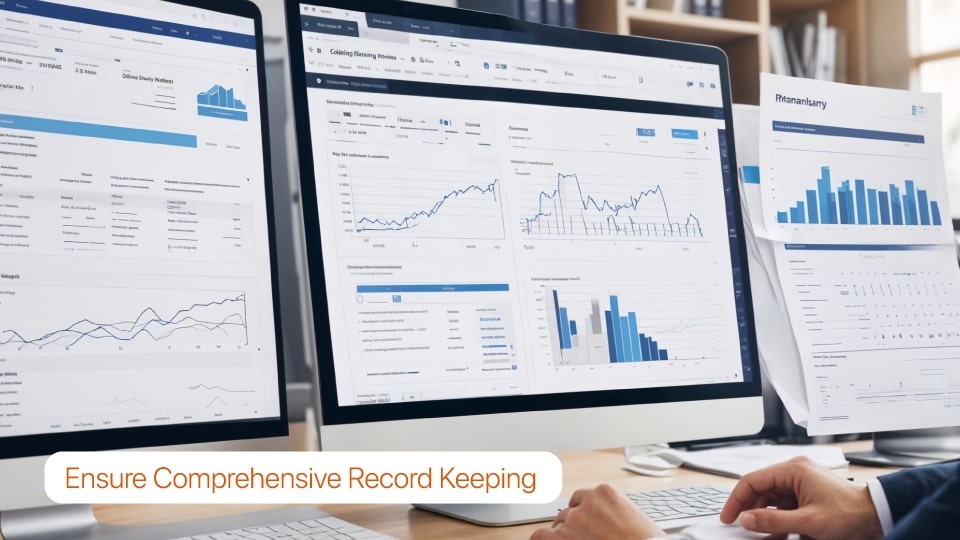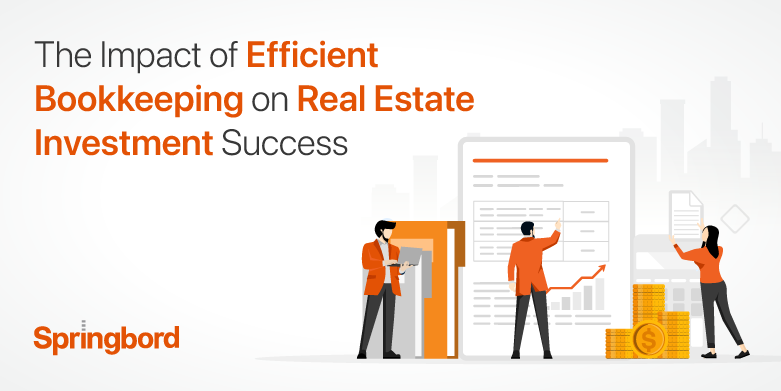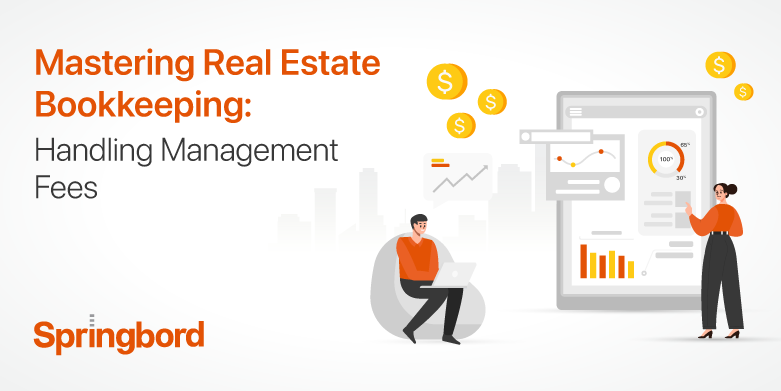 Read time 6 min
Read time 6 minIntroduction
In property management, precise bookkeeping is not just a necessity but a cornerstone of success. Accurate financial records ensure compliance, foster investor confidence, and facilitate informed decision-making.
However, the complexities of managing multiple properties, tenants, and financial transactions can pose significant challenges.
In this blog, we will delve into ten advanced bookkeeping practices essential for property managers, addressing common pain points and offering solutions to streamline financial management.
1. Segregate Personal and Business Finances
Maintaining a clear distinction between personal and business finances is foundational to effective property management. Blurring these lines can lead to financial confusion, complicate tax filings, and expose personal assets to business liabilities.
Importance of Separation
- Ensures clarity in financial records: Keeping personal and business expenses separate allows for precise tracking of business performance.
- Simplifies tax filing and compliance: Clear separation simplifies the preparation of accurate tax returns, ensuring compliance with tax regulations.
- Protects personal assets: Segregating finances protects personal assets from potential business liabilities.
Practical Steps
- Open separate business bank accounts and credit cards: Establishing dedicated accounts ensures that all business transactions are distinctly recorded.
- Implement a clear accounting system: Utilizing an organized accounting system tailored to property management helps maintain clear financial boundaries.
Springbord’s expertise in setting up and managing distinct financial accounts helps property managers achieve clarity and compliance in their financial records.
2. Automate Rent Collection and Tracking
Automating rent collection and tracking is important for minimizing errors, ensuring timely payments, and enhancing tenant satisfaction.
Manual processes are prone to mistakes and inefficiencies, which can disrupt cash flow and tenant relationships.
Benefits of Automation
- Reduces manual errors: Automation minimizes human errors in rent calculations and payment processing.
- Ensures timely payments: Automated systems facilitate consistent and timely rent payments, improving cash flow stability.
- Enhances tenant satisfaction: Providing tenants with convenient online payment options can improve their overall satisfaction and reduce late payments.
Tools and Techniques
- Utilize property management software with automated payment processing: Integrated systems for automating rent collecting and tracking are provided by software solutions.
- Set up automated reminders for late payments: Configure the software to send automatic reminders to tenants when payments are due or overdue, helping maintain consistent payment schedules.
Springbord’s implementation of advanced property management software ensures that property managers can leverage automation to optimize rent collection and enhance tenant satisfaction.
3. Maintain Accurate Expense Tracking
Accurate expense tracking is vital for understanding the financial health of a property management business. It involves categorizing and recording all expenses meticulously to ensure that budgets are maintained and financial goals are met.
Key Expense Categories
- Maintenance and repairs: Regular upkeep and unexpected repairs are significant ongoing expenses that need meticulous tracking.
- Utilities: Costs for water, electricity, and other utilities must be accurately recorded and allocated.
- Property taxes: Keeping precise records of property tax payments is essential for budgeting and compliance.
- Insurance premiums: Documenting insurance costs helps in budgeting and ensures adequate coverage.
Best Practices
- Use expense tracking software: Tracking and classifying expenditures more effectively may be achieved by utilizing tools.
- Regularly reconcile bank statements: Monthly reconciliation of bank statements ensures that all recorded expenses match actual expenditures, identifying discrepancies early.
Springbord’s proficient use of cutting-edge expense tracking tools and meticulous reconciliation processes guarantees accurate and comprehensive financial records for property managers.
4. Implement a Robust Accounts Payable System
Managing accounts payable in property management involves handling multiple vendors and ensuring timely payments. Implementing a robust accounts payable system is crucial for maintaining good vendor relationships and avoiding late fees.
Challenges in Accounts Payable
- Managing multiple vendors: Coordinating with various service providers and suppliers can be complex and time-consuming.
- Ensuring timely payments: Late payments can damage vendor relationships and incur additional fees or interest.
Solutions
- Centralize invoice processing: Streamlining invoice processing through a centralized system can help in tracking and managing vendor payments more efficiently.
- Utilize AP automation tools: Accounts payable automation tools can significantly reduce manual work, ensure timely payments, and provide better visibility into outstanding liabilities.
- Establish clear payment schedules: Setting up structured payment schedules helps in planning cash flows and maintaining good vendor relationships.
Springbord’s specialized accounts payable solutions incorporate automation and centralized processing, ensuring efficient management of vendor payments and enhancing overall financial operations.
5. Ensure Comprehensive Record Keeping
Comprehensive record-keeping is crucial for effective property management. Maintaining accurate and accessible records of all transactions and agreements ensures compliance and aids in resolving disputes.

Essential Documents
- Lease agreements: Detailed records of lease agreements ensure that all terms and conditions are documented and accessible.
- Vendor contracts: Keeping vendor contracts on file helps in managing relationships and resolving disputes.
- Financial statements: Accurate and up-to-date financial statements are crucial for assessing the financial health of the property management business.
Record Keeping Strategies
- Digitize documents for easy access: Converting paper documents into digital format ensures they are easily retrievable and protected against physical damage.
- Implement a document management system: Using a document management system helps in organizing, storing, and accessing critical documents efficiently.
Springbord’s implementation of advanced document management systems ensures that property managers have secure, organized, and easily accessible records, enhancing operational efficiency and compliance.
6. Conduct Regular Financial Audits
Regular financial audits are essential for maintaining the integrity of financial records and ensuring compliance with regulations. They help in identifying discrepancies and provide a clear picture of the financial health of the business.
Purpose of Audits
- Identify discrepancies: Audits help in uncovering errors or inconsistencies in financial records.
- Ensure compliance with financial regulations: Regular audits ensure that financial practices align with regulatory requirements and industry standards.
Audit Process
- Internal audits by property managers: Conducting regular internal audits helps in the early detection of issues and maintains accurate records.
- External audits by professional accountants: External audits provide an unbiased review of financial records and ensure compliance with all regulatory requirements.
Springbord’s expertise in conducting thorough financial audits ensures that property managers maintain accurate and compliant financial records.
7. Master the Chart of Accounts
A detailed chart of accounts is fundamental for accurate financial reporting and effective expense tracking. It categorizes all financial transactions, facilitating clear and organized financial records.

Importance of a Detailed Chart of Accounts
- Facilitates accurate financial reporting: A well-structured chart of accounts helps in generating precise financial reports.
- Helps in tracking income and expenses by category: Categorizing transactions enables detailed tracking of income and expenses, aiding in budget management.
Tips for Optimization
- Customize the chart of accounts to suit specific property management needs: Tailor the chart of accounts to reflect the unique financial structure of your property management business.
- Regularly review and update account categories: Periodically updating the chart of accounts ensures it remains relevant and effective.
Springbord’s tailored solutions for creating and managing a detailed chart of accounts ensure that property managers have accurate and organized financial records.
8. Manage Tenant Security Deposits Efficiently
Efficient management of tenant security deposits is critical for legal compliance and maintaining tenant trust. Proper handling ensures that security deposits are managed transparently and following regulations.
Legal Requirements
- Adhere to state and local regulations on security deposits: Compliance with regulations governing security deposits is essential to avoid legal issues.
Best Practices
- Maintain separate accounts for security deposits: Keeping security deposits in separate accounts ensures transparency and compliance with legal requirements.
- Provide clear documentation to tenants: Documenting the receipt and return of security deposits builds trust and avoids disputes.
Springbord’s expertise in managing tenant security deposits ensures compliance with regulations and fosters positive tenant relationships.
9. Prepare for Tax Season
Proper preparation for tax season is crucial for minimizing tax liabilities and ensuring compliance. Accurate and detailed financial records are essential for identifying eligible deductions and preparing precise tax returns.
Common Tax Deductions
- Mortgage interest: Deducting mortgage interest reduces taxable income.
- Depreciation: Depreciating property value provides significant tax benefits.
- Property repairs: Deducting repair costs lowers taxable income.
Preparation Tips
- Keep detailed records of all transactions: Comprehensive records ensure accurate tax filings and identify all eligible deductions.
- Work with a tax professional familiar with property management: A specialized tax professional can provide valuable insights and ensure compliance with tax laws.
Springbord’s detailed record-keeping and expert tax preparation services ensure that property managers are well-prepared for tax season.
10. Leverage Financial Reporting for Strategic Planning
Financial reporting is a powerful tool for strategic planning and decision-making. Detailed financial reports provide insights into the financial health of the business and inform strategic decisions.
Essential Reports
- Profit and Loss Statement: Provides a summary of income and expenses over a specific period.
- Balance Sheet: Offers a snapshot of the business’s financial position at a given point in time.
- Cash Flow Statement: Cash inflows and outflows from the company are tracked
Utilizing Reports
- Analyze financial health and performance: Detailed analysis of financial reports helps in assessing the business’s financial performance.
- Make informed decisions on property acquisitions and improvements: Financial reports provide the data needed to make strategic investment decisions.

Springbord’s advanced financial reporting solutions empower property managers with the insights needed for effective strategic planning.
Conclusion
Advanced bookkeeping is crucial for the effective management of property portfolios.
By implementing these ten practices, property managers can overcome common challenges, ensure regulatory compliance, and optimize financial performance. Adopting these strategies will not only enhance day-to-day operations but also contribute to the long-term success and growth of your property management business.
Transform your bookkeeping service with Springbord! Our expert bookkeeping solutions bring precision, clarity, and efficiency to your financial operations. Say goodbye to headaches and hello to streamlined success. Take your company to new heights by partnering with Springbord. Contact us today to unlock your full potential and drive your property management to excellence!
Contact us today to unlock your full potential and drive your property management to excellence!







